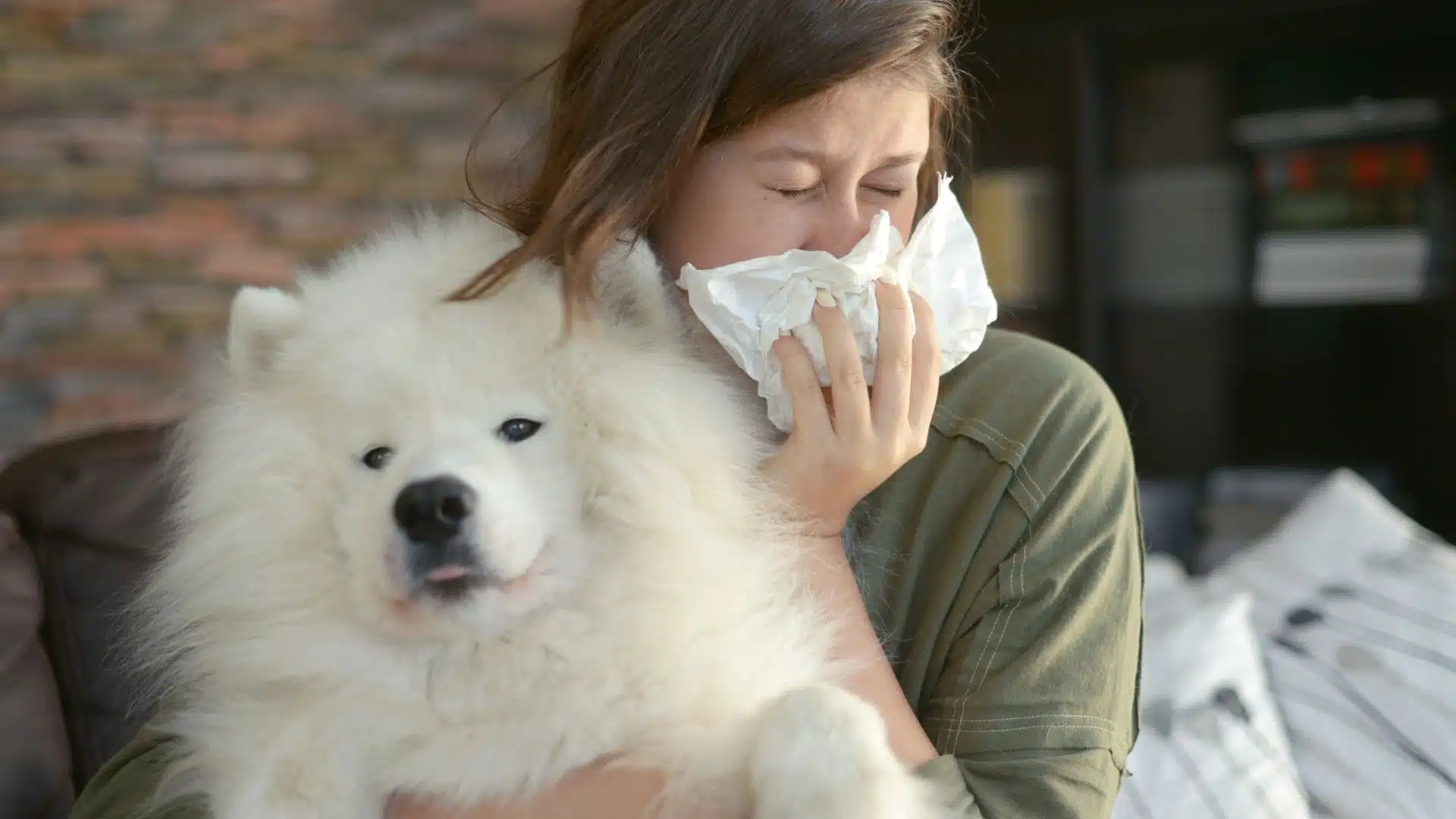

The term ‘dog allergies’ is used to describe two types of issues: the condition in pets and the one that affects people. In this article, we’re going to look at how pet allergy affects our canine friends.
Most people who are allergic to dogs exhibit respiratory symptoms such as shortness of breath, coughing, swelling, itching in their nose and eye area.
There are several different allergies that dogs can develop. They can have food allergies, seasonal allergies, and they can have severe acute allergic reactions. Luckily, dogs rarely suffer from anaphylactic shock when they are bitten by an insect or given a certain medication.
Before we move on to the rest of the article, we’d like to note that allergies in dogs can be quite challenging to diagnose and treat. Knowing the symptoms and keeping an eye on your pet is the best way of going about things as you can easily tell when veterinary assistance is necessary.

Allergy symptoms in pets depend on the exact type of allergy that the dog has. There are three main types of dog allergies.
Skin allergies are by far the most common type that dogs can have. Flea bites, food, as well as a variety of environmental factors, can all cause allergic reactions that mostly involve the dog’s epidermis.
Although less common compared to other types of skin allergies, food allergies can affect dogs. Dogs may exhibit a variety of symptoms such as itchiness, dander, and dermatitis, particularly in their ear and paw areas.
In any case, if there is an allergen in your dog’s food, it’s quite likely that the pooch is going to experience another type of allergic reaction mostly relating to their gastrointestinal system.
The symptoms of flea allergy dermatitis involve extreme itchiness, scabbing, dander, and the presence of fleas or flea feces on the dog’s body. Flea pet allergies are extremely common, especially in the warm season.
While all dogs may be allergic to flea bites, those that have a good immune system and that are healthy adults are likely to recover fast after receiving topical medication against their external parasites. Allergies may cause varying symptoms also depending on the dog’s age or the severity of the flea infestation.
If you are the owner of a healthy adult dog, your veterinarian might simply recommend a spot-on solution to get rid of the fleas and wait for a couple of days to see whether the symptoms don’t subside naturally.
One thing we’d like to note is that in this case, the clinical signs you can notice in your pet mostly involve the epidermis, so you’ll notice dead skin and itchiness. Respiratory symptoms are uncommon, so a runny nose or allergic rhinitis are not going to be noticeable.

Environmental allergens can be seasonal, such as pollen, or they can be present in the dog’s living space. Dust and mold are two other allergens, but so are some types of cleaning products. If your dog is allergic to something in their environment, you might notice the following signs:
If your dog has a food allergy, it’s quite likely that they are going to experience both skin symptoms and gastrointestinal distress. The severity of the clinical signs depends on how effective the dog’s immune system is.
For example, while some dogs might show light skin allergy symptoms, others can experience quite dramatic ones.
Food allergies in dogs can also cause chronic foot and ear infections, dander, severe itching, but also vomiting or diarrhea. Diarrhea is more common as it is the body’s response to the food, so it is an attempt to eliminate it as soon as possible.
Your dog may have an allergic reaction to a variety of allergens in their food and it can be quite difficult to tell which one is the culprit. Usually, your veterinarian will use an elimination diet if nothing else seems to work.
Dogs can be allergic to many ingredients such as specific proteins (chicken and beef) or grains such as wheat or corn, which have no place in a healthy dog’s diet. Unfortunately, many of the commercial dog food varieties that you can get these days contain these allergens, especially the grains, and that’s because they are used to bulk up the kibble and make it cheaper.
Sometimes, your dog might respond better to switching their diet to a homemade one that contains healthy protein and fiber from healthy sources like pumpkin, which doesn’t cause gastrointestinal side effects.
Elevate your dog’s grooming routine with our curated selection of top supplements, dedicated to nurturing vibrant skin and lustrous coats. Enriched with essential nutrients such as omega-3 fatty acids, biotin, and vitamins, these supplements are designed to address dryness, itching, and promote a healthy, glossy fur texture.
Even though medications and biological products such as vaccines very rarely cause anaphylactic shock in dogs, these should not be overruled.
For this reason, even when you go to a regular checkup, your veterinarian might ask you to stick around the animal hospital for a period of fifteen to twenty minutes just to be sure that your dog doesn’t have an acute allergic reaction.
Your veterinarian has specific treatment against such reactions so they can help your dog by administering the correct medications right away. If your pooch develops this type of dog allergy, they might show symptoms such as the following:
If your dog has experienced such an allergic reaction before, the veterinarian might recommend allergy testing so that you know what to expect in the future.
Canine asthma, which is also called allergic bronchitis, can be an allergy reaction to something that the dog has encountered in its environment. Sometimes, dogs inhale allergens such as pollen.
While anaphylactic shock rarely causes respiratory symptoms, seasonal allergies can be related to asthma. If your dog has an acute allergic response to a specific antigen that they’ve breathed in, they will show severe signs such as the following:
Your veterinarian can perform an allergy test that can reveal what your dog is allergic to. If the testing hasn’t been performed, diagnosing the exact type of allergy your dog has can be quite challenging. For this reason, your vet might refer you to a veterinary allergist.
Flea allergies are the easiest to diagnose and treat. Elimination diets can be quite useful for food allergies. Atopic dermatitis can be challenging to treat, especially since administering corticosteroids to dogs over a long period of time can have negative effects on their immune system.
Avoiding allergen is the best way to prevent allergic reactions in dogs. Immunotherapy might be necessary in some cases, as well as a variety of anti-inflammatory medications.
Dogs that have respiratory seasonal allergies can experience some relief if you walk them in specific areas where they might not be exposed to the allergens. Your pet might be prescribed antihistamines, decongestants, as well as allergy shots.

The first piece of advice that we can give you is to take your dog to the pet hospital before anything else. Nothing is better than a correct diagnosis, and once your veterinarian prescribes the right treatment, you have to make sure you never skip a dose.
Do your best at limiting your dog’s exposure to allergens. Switch your dog to a hypoallergenic food brand if your vet recommends this.
Bathing your dog might reduce some of the itchiness, but you also have to find out what shampoo is best to use in this case. Some shampoos can contain harsh substances that affect your dog’s skin pH and create an imbalance which can make the allergy signs even more severe.
Try to avoid giving your pet medications that your vet hasn’t recommended at all. It is true that some veterinarians have used over-the-counter antihistamines for humans before, such as Claritin or Benadryl, but they can have their share of side effects. Every dog’s health status and body are unique. Give these drugs to your canine friend only if the vet advises you to do so.
If you have a canine and feline friend and they are both exhibiting symptoms of allergies, you should know that what works for your dog might not do the same for your cat. Cats are extremely sensitive to some medications and can develop severe reactions to them, so stick to your vet’s advice.
If your vet has prescribed any, you might also be able to give your dog specific antibiotics or anti-yeast medications, as well as anti-itch and anti-inflammatory meds that can provide the relief that your pooch needs — such as Prednisone or Apoquel.
Using an allergy itch relief shampoo or an antibacterial and antifungal medicated shampoo can be quite helpful if you have nothing against giving your dog frequent baths — so long as the product is safe, your veterinarian might even agree that it’s one of the best solutions.
Fatty acid supplements such as omega chews can help your pet’s skin recover faster. Besides the improvement that omega supplements have on pet allergy symptoms, they are also great for maintaining your pet’s cardiovascular and brain health in check.
Chamomile tea, yogurt, as well as coconut oil, and apple cider vinegar can be other natural remedies for this type of health issue.
If you enjoyed reading this vet corner article, head over to our vet corner section where more expert advice can be found.
Most of us train our dogs when they are puppies to jump up on furniture. We think it’s harmless (and easier than always lifting them), but for dogs, couches and beds are very high compared to the size of their bodies.
Every time they jump it compresses their back and applies enormous force to their joints.
It’s no wonder that an incredible 80% of dogs experience arthritis or joint pain by only 7 years old.
Luckily, there is a vet-recommended solution.
It’s the PawRamp by Alpha Paw. An adjustable ramp that allows dogs to safely get on and off couches and beds. PawRamp makes joining you in bed or on the couch effortless and fun.
As a bonus, you can use code SAVE35 to get $35 off the PawRamp today.

The medical, nutritional, or behavioral advice we provide is intended for informational and educational purposes only. Our editorial content is not a substitute for formal or personalized medical advice from a veterinary professional. Only board-certified veterinary specialists who have examined your pet should diagnose medical conditions, provide personalized treatment, or prescribe appropriate medication. For questions regarding your pet’s health, or if your pet is exhibiting signs of illness, injury, or distress, contact your veterinarian immediately. Never disregard professional medical advice or delay in seeking it because of something you have read on our site.